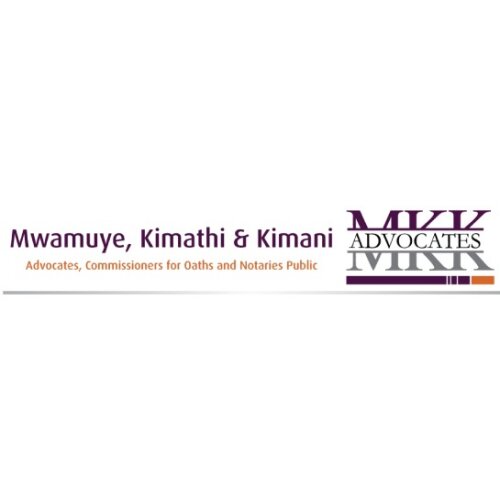Best Renewable & Alternative Energy Lawyers in Kisumu
Share your needs with us, get contacted by law firms.
Free. Takes 2 min.
List of the best lawyers in Kisumu, Kenya
About Renewable & Alternative Energy Law in Kisumu, Kenya
Renewable and alternative energy law in Kisumu, Kenya, relates to the legal principles and regulations that govern the generation, distribution, use, and promotion of energy produced from renewable sources. These include solar, wind, biomass, hydropower, and geothermal energy. Kisumu, as part of Kenya’s broader push toward sustainable energy, has witnessed increased interest in alternative energy solutions to supplement the national grid, reduce reliance on fossil fuels, and support rural electrification. The legal landscape oversees issues such as permits, land use, environmental impact, energy tariffs, and incentives for investment in renewable energy projects.
Why You May Need a Lawyer
Seeking the guidance of a lawyer when dealing with renewable and alternative energy matters in Kisumu can be crucial. Several situations may demand legal assistance, including:
- Navigating complex regulatory requirements for starting a renewable energy project.
- Drafting and reviewing contracts with technology providers, investors, or government agencies.
- Handling land acquisition and lease agreements for solar, wind, or hydro installations.
- Managing disputes over land rights, access, and compensation involving communities or private parties.
- Ensuring environmental compliance and securing necessary approvals from agencies.
- Applying for government incentives, grants, or tax exemptions for renewable energy investments.
- Understanding intellectual property rights around proprietary technology and know-how.
- Advising on the importation and licensing of renewable energy equipment.
- Protecting community interests in off-grid and mini-grid projects.
A lawyer can clarify legal obligations, mitigate risks, and ensure that your interests are protected throughout the project life cycle.
Local Laws Overview
The regulation of renewable and alternative energy in Kisumu falls under several key Kenyan statutes, policies, and local county regulations:
- Energy Act, 2019: The primary law that regulates all energy matters, establishing the Energy and Petroleum Regulatory Authority (EPRA), promoting renewable energy, licensing generation and distribution, and providing frameworks for mini-grids and off-grid solutions.
- Environmental Management and Coordination Act (EMCA): Mandates environmental impact assessments (EIA) for significant energy projects and ongoing compliance with environmental standards.
- County Government Policies: Kisumu County may have additional requirements or facilitation measures for renewable energy investments, especially for rural electrification and land use planning.
- Land Laws: Issues related to land ownership, leases, and usage rights are handled under the Land Act, Land Registration Act, and community land regulations.
- Feed-in Tariff Policy: This policy supports renewable electricity production by guaranteeing prices for specific energy sources, encouraging private investment.
- Tax and Import Incentives: Specific exemptions or reductions for renewable energy equipment and components are available, subject to compliance.
Stakeholders must take care to align their activities with both national legislation and any additional regulations enforced by Kisumu County authorities.
Frequently Asked Questions
What kinds of renewable energy projects are popular in Kisumu?
Solar and biomass projects are particularly popular in Kisumu due to abundant sunlight and agricultural waste, with mini-hydro and wind projects also gaining interest.
What is the process for getting an energy generation license in Kisumu?
Applicants must apply to EPRA, submit detailed project plans, undertake an environmental impact assessment, and comply with safety and technical standards before being granted a license.
Do I need county approval to install solar panels on my property?
Small-scale, rooftop solar installations may only require compliance with building codes, while commercial or community-scale projects often need explicit county approvals and permits.
Are there incentives for investing in renewable energy in Kisumu?
Yes, there are government incentives such as import duty waivers, VAT exemptions, and feed-in tariffs for certain renewable energy generators, subject to qualification.
How do I resolve land disputes related to energy projects?
Land disputes can be resolved through negotiation, mediation, or legal proceedings using Kenya’s land courts, especially if the conflict involves community or private landowners.
What environmental steps must I follow for a new project?
You must conduct an Environmental Impact Assessment (EIA), submit it to NEMA for approval, and comply with any ongoing environmental monitoring and reporting obligations.
Who regulates energy tariffs for renewable energy in Kisumu?
The Energy and Petroleum Regulatory Authority (EPRA) sets and regulates tariffs for electricity generated by grid-connected and approved off-grid projects.
Can individuals or businesses sell renewable energy to the grid?
Yes, licensed independent power producers can sell electricity to the national grid or distribute it locally, subject to the Energy Act and EPRA regulations.
Are there special legal considerations for community energy projects?
Community projects must address communal land rights, inclusive benefit sharing, and specific compliance with both land and energy regulations to operate legally.
How can a lawyer assist with my renewable energy project in Kisumu?
A lawyer can help with regulatory compliance, drafting contracts, securing permits, handling disputes, facilitating negotiations with authorities, and ensuring overall project legality.
Additional Resources
Several governmental bodies and organizations can assist individuals and businesses interested in renewable and alternative energy in Kisumu:
- Energy and Petroleum Regulatory Authority (EPRA) - regulation and licensing
- National Environment Management Authority (NEMA) - environmental compliance
- Kenya Power and Lighting Company (KPLC) - grid connection and technical requirements
- Kisumu County Government - local approvals and community engagement
- Ministry of Energy - policy and incentives information
- Kenya Renewable Energy Association - networking and industry support
- Kenya National Chamber of Commerce and Industry - business resources
- Local law firms with energy sector specialization for customized legal advice
Next Steps
If you require legal advice or support for a renewable or alternative energy matter in Kisumu, it is advisable to:
- Identify the nature and scope of your project or legal issue.
- Collect all relevant documents, plans, and correspondence.
- Consult with a lawyer experienced in energy and environmental law, ideally with knowledge of Kisumu County’s regulations.
- Discuss your objectives and any specific areas of concern with your legal advisor.
- Work closely with your lawyer to navigate licensing, compliance, and ongoing legal obligations.
- Stay updated with the changing regulations and incentives that may impact your project.
Engaging professional legal help early in the process can save time, minimize risks, and ensure successful completion of your renewable energy project in Kisumu.
Lawzana helps you find the best lawyers and law firms in Kisumu through a curated and pre-screened list of qualified legal professionals. Our platform offers rankings and detailed profiles of attorneys and law firms, allowing you to compare based on practice areas, including Renewable & Alternative Energy, experience, and client feedback.
Each profile includes a description of the firm's areas of practice, client reviews, team members and partners, year of establishment, spoken languages, office locations, contact information, social media presence, and any published articles or resources. Most firms on our platform speak English and are experienced in both local and international legal matters.
Get a quote from top-rated law firms in Kisumu, Kenya — quickly, securely, and without unnecessary hassle.
Disclaimer:
The information provided on this page is for general informational purposes only and does not constitute legal advice. While we strive to ensure the accuracy and relevance of the content, legal information may change over time, and interpretations of the law can vary. You should always consult with a qualified legal professional for advice specific to your situation.
We disclaim all liability for actions taken or not taken based on the content of this page. If you believe any information is incorrect or outdated, please contact us, and we will review and update it where appropriate.









